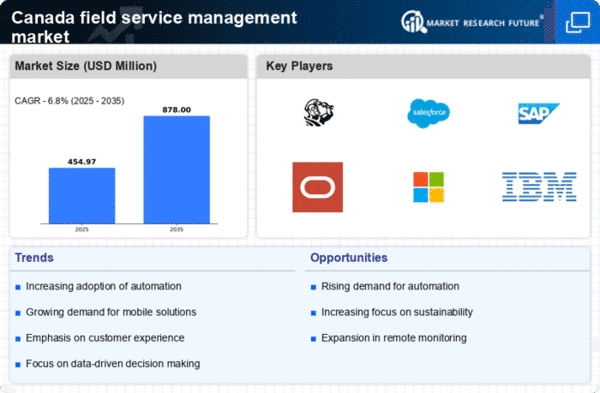Regulatory Compliance and Safety Standards
The field service-management market in Canada is significantly influenced by stringent regulatory compliance and safety standards. Companies are required to adhere to various regulations that govern service delivery, particularly in sectors such as utilities and healthcare. Compliance not only ensures safety but also enhances operational credibility. The costs associated with non-compliance can be substantial, potentially reaching millions of dollars. Therefore, organizations are increasingly investing in field service management solutions that help maintain compliance, making this a vital driver for the market.
Shift Towards Remote Work and Virtual Services
The shift towards remote work and virtual services is reshaping the field service-management market in Canada. Organizations are increasingly adopting remote service capabilities, allowing technicians to assist customers without being physically present. This trend is driven by advancements in communication technologies and the need for operational flexibility. Reports suggest that companies implementing remote service solutions can reduce travel costs by up to 25%. This shift not only enhances service efficiency but also expands the reach of service providers, thereby acting as a significant driver for the field service-management market.
Growing Demand for Enhanced Customer Experience
In the competitive landscape of the field service-management market, the demand for enhanced customer experience is becoming increasingly pronounced. Companies are recognizing that superior service can differentiate them from competitors. As a result, organizations are investing in tools that facilitate better communication and service tracking for customers. Data indicates that businesses focusing on customer experience improvements can see a revenue increase of approximately 20%. This trend underscores the importance of customer-centric strategies in driving growth within the field service-management market.
Technological Advancements in Field Service Management
The field service-management market in Canada is experiencing a notable transformation due to rapid technological advancements. Innovations such as IoT, AI, and machine learning are enhancing operational efficiency and service delivery. For instance, IoT devices enable real-time monitoring of equipment, which can lead to predictive maintenance and reduced downtime. According to recent data, the adoption of these technologies is projected to increase operational efficiency by up to 30% in the coming years. This shift not only improves customer satisfaction but also optimizes resource allocation, making it a critical driver for the field service-management market.
Increased Investment in Workforce Training and Development
Investment in workforce training and development is emerging as a crucial driver for the field service-management market in Canada. As technologies evolve, the need for skilled technicians who can effectively utilize advanced tools becomes paramount. Companies are recognizing that a well-trained workforce can lead to improved service quality and operational efficiency. Data suggests that organizations investing in employee training can experience a productivity increase of around 15%. This focus on workforce development is likely to play a pivotal role in shaping the future of the field service-management market.
















